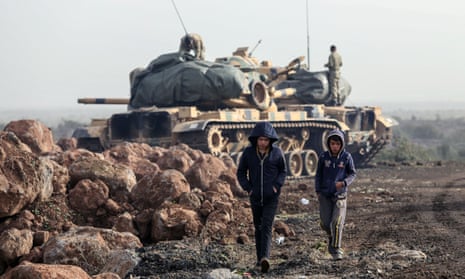Up to 24 civilians have been killed and an estimated 5,000 displaced in the first three days of Turkey’s offensive against a Kurdish enclave in northern Syria, the United Nations and monitors said on Tuesday.
Turkey launched the assault on Saturday, aiming to force the Syrian Kurdish Democratic Union party (PYD) and its military wing, the People’s Protection Units (YPG), out of Afrin. Ankara says the militia is the Syrian arm of a terror group that has fought a decades-long insurgency inside Turkey.
A UN report citing local sources said three days of intensive shelling and airstrikes had displaced 5,000 people but some of most vulnerable people could not flee.
The Syrian Observatory for Human Rights, a war monitor with wide contacts inside Syria, said 24 civilians had died, as well as 25 Syrian rebels fighting alongside Turkey and 26 Kurdish fighters.
Turkish officials on Tuesday said two of its soldiers had been killed. “We will not leave the blood of our martyrs on the ground and will continue our struggle until we root out terror,” the foreign minister Mevlüt Çavuşoğlu tweeted.
The latest conflict was sparked by a US announcement that it intended to build a 30,000-strong border force to patrol Syria’s frontiers that would include the YPG.
Turkey sought Russia’s backing to use the airspace over Afrin and to conduct the operation, which aims to create a 30km-deep buffer zone to shield Turkish border towns from any incursions or rocket attacks.
In a sign of deepening tension with Washington, President Recep Tayyip Erdoğan on Monday night rejected a US statement urging restraint and stating that the operation ought to be limited in scope, though acknowledging that Turkey had legitimate concerns over its border security.
“Then I ask the US: did you have any specific time duration in Afghanistan, when will it end? You entered Iraq before we came to power – has the time duration ended in Iraq, you are still there?” Erdoğan said in a speech in Ankara.
The YPG blamed Moscow once again for allowing Turkey to conduct the Olive Branch operation, in another hint at the dynamics of the superpower rivalry in northern Syria. The YPG had essentially enjoyed a security umbrella as a coalition partner with the US, but has found itself isolated within the enclave with little Washington can do to deter Turkey’s offensive.
“Turkey would not dare to shell our cities and villages and commit massacres against the civilians, if Russia did not withdraw from their morality and did not allow Turkish planes fly over [Afrin],” said the Syrian Democratic Forces, an alliance that includes the YPG and spearheaded ground campaigns against Isis. The group demanded that both the US-led coalition and Russia explain their position towards Turkey’s offensive.
The UN said it was ready to deliver aid to 50,000 people in Afrin and had supplies for 30,000 in case of further displacement.
